The anatomical structure and functional capacity of the organism of the child and the teenager are still at the stage of formation. If in process of a growing baby changes in his behavior or habits, you should not jump to conclusions about the deteriorating health.
Frequent urination in a child can be caused by natural causes, but to consult with the doctor be sure. Before the visit to the doctor parents need to count the number of visits by children to the toilet, and also ask them about possible pain when emptying the bladder.Frequent urination in a child can be a sign of pathology.
Undoubtedly, you should pay attention to the frequent urination in children. If the kid was drinking cranberry juice, served watermelon or melon, such reaction is to be expected. Even in the absence of complaints of the baby for any discomfort you should see a pediatric urologist.
Pollakiuria, or syndrome frequent emptying of the bladder in children and adolescents and develops under the influence of many negative factors. In addition to reducing the body’s resistance to infections, the cause of the pathological condition sometimes becomes a stressful situation for him.
This may be a change of educational institution, moving to a new place of residence, parental divorce or death of a close relative. The nervous system of the baby can not cope with this load, and the body responds by urinary disorders.
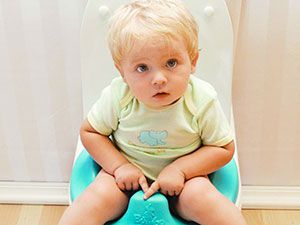
For the initial diagnosis of possible disease the physician needs to know what is the number of evacuations of the bladder of the child during the day. If the indicators do not exceed the norm, in the absence of complaints of the child to pain or burning, further treatment is not carried out.
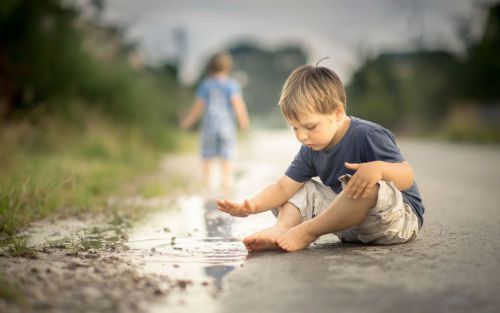
Pediatric urologist focuses on the following values:
- in the first days of life the baby urinates 5 times a day;
- the amount of urination in a child up to 6 months – 20 times;
- by the year the baby urinates at most 15 times;
- from one year to 3 years, the indicator of the rate of 10 voids per day;
- from 3 to 6 years of age and not more than 8 times;
- from 6 years of age and older – 5 times.
Hypothermia is one of the causes of frequent urge to empty the bladder
The frequency of emptying the bladder changes as the child grows. This is due to the gradual formation of the organs of the urinary system. To adolescence is the development of all vital systems. For example, kidneys in human form for a few years.
These paired organs perform essential functions:
- support optimal balance of minerals and body fluids;
- output products of metabolism, toxic compounds, toxins from the blood stream;
- respond to the accumulation of glucose in the body;
- stabilize blood pressure.
Active growth of the child, excessive load to natural changes in the structural elements of the kidneys have an impact on their functioning. First of all this is reflected in the increase in the number of urination.
A slight deviation from the norm should not be a cause for alarm. Parents do not need to constantly count the number of visits to a toddler the toilet and to compare the obtained values with the indices yesterday. If today the child often sits on the potty, then it’s not a reason for concern. Maybe he’s with daddy long sledding from a hill or drank a lot of delicious lemonade with grandma in cafe.
Natural causes
Pollakiuria, which arose under the influence of natural factors is physiological. As a rule, this condition does not require medical intervention. The number of evacuations of the bladder, the child can be corrected by change of diet or reduced physical activity.
Frequent urination in children without pain occurs for the following reasons:
- a large amount of fluid. Reaction of a baby to a significant amount of fluid is quite predictable: the more in the diet of juice, water or lemonade, the more often he asks for the potty. But such a cause of frequent urination should alert parents if the child is constantly asking for a drink, complaining of thirst. It should be a signal to visit an endocrinologist for exclusion of disorders of the endocrine glands;
- diuretic medicines. If the child began to frequently urinate on the background of therapy of any disease, parents need to carefully read the attached summary. The active ingredients of many drugs have a weak or strong diuretic properties. The baby will be less likely to visit the toilet immediately after recovery;
- products with diuretic action. Children will often urinate in the use of sour berries (bilberry, cranberry, black currant), cucumbers, watermelons, fruit drinks. Many herbal kids includes rose hips and hop cones. These drugs have a diuretic effect, so it is best not to use them before bedtime;
- spicy and salty food. As they grow up in the diet is that the food is cooked with addition of pepper, turmeric or cumin. Smoked fish or meat, salted nuts and cheese can cause severe thirst and frequent urge to empty the bladder. Increases the amount of fluids you drink – and frequent urination;
- hypothermia. Long walks or being in a cold room provoke reflex spasm of the renal vessels. Accelerates filtration of urine and its excretion from the body. Frequency of urination is reduced after rewarming the baby;
- increased motor activity. Experience during the game passion leads to the release into the bloodstream of adrenaline. This hormone raises blood pressure, makes the heart beat faster. In the body of a child increases the metabolism that causes the kidneys to increase blood filtration and to provide a lot of urine;
- emotional stress. Unfriendly atmosphere in the kindergarten, the school, the family can trigger voiding. Adults should approach a child to talk to him about what is happening, to help eliminate the negative factors. If the baby is closed in itself and does not respond to attempts by adults to resolve the situation, the parents and the child needed counseling.
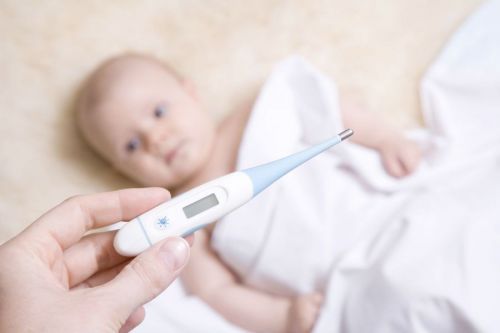
Thamuria physiological origin is of a temporary nature. After the removal of a provoking factor in the baby’s frequency of urination becomes normal. But parents should alert other changes occurred on the background of pollakiuria.
Fever and frequent urination in a child serve as a signal for treatment to the doctor
Pathological causes
Increased urinary frequency accompanied by thirst, painful cramps in the abdomen or a change of color and odor of urine are a cause for concern. Do not postpone visit to the doctor for diagnostic tests.
The sooner treatment begins, the less will have complications and faster recovery will come. There are many diseases that contribute to the violation of urination in a child. Frequent emptying of the bladder is one of the main symptoms of the disease.
Diabetes mellitus and diabetes insipidus origin
Despite the similar name, the mechanism of development of these pathologies are different. But they share a common symptom – frequent urination. Cause of diabetes mellitus etiology is a violation of the endocrine system of the child.
Due to the insufficient content of insulin increases the concentration of glucose in the bloodstream. The disease is characterized by a chronic course, a violation of the metabolism of fats, proteins and carbohydrates, changing the water-salt balance.
Parents should pay attention to the change in drinking regimen of the baby.
Also symptoms of diabetes include:
- increased appetite;
- reduction of body weight;
- dryness of the skin.
Frequent urination provoke a strong dehydration of the child, which should be eliminated by using pharmacological drugs. Otherwise, after a few months the skin form inflammatory lesions, blisters with purulent contents. The characteristic feature of endocrine pathology is an unbearable itching.
Diabetes insipidus origin develops due to the decrease in the functional activity of the pituitary or hypothalamus. These parts of the brain responsible for the production of vasopressin. Hormone involved in the regulation of reverse suction of liquid during blood filtration by the kidneys.
The lack of content in the body of biologically active substances leads to increased urine output. This pathology refers to diagnosed rare diseases, requires urgent correction of a hormonal background. Symptoms of diabetes insipidus similar to diabetes symptoms.
Diseases of the urinary system
Increased painful urination without changes to the drinking regime of a baby can be a symptoms of penetration into the urinary tract pathogens. Should ask the child about what he feels the emptying of the bladder, does it hurt his tummy. Parents need to pay attention to the volume of urine, its color and smell.
Hypothermia is often the cause of acute cystitis. The disease develops more often in girls because of the peculiarities of the anatomical structure (wide and short urethra). Boys cystitis is accompanied by urethritis – inflammation in the urethra.
For a pathological condition characterized by such symptoms:
- there are pains, burning while emptying the bladder;
- there are painful spasms in the abdomen;
- the temperature rises;
- changes the color of urine, there will be found a precipitate in the form of flakes or blood clots.
Cystitis, pyelonephritis, or glomerulonephritis, the parents can recognize at an early stage. If the kid laughed, sneezed, coughed, and he has an uncontrolled emptying of the bladder or leakage of urine, then the body came the pathogenic microbes.
Inflammation urinary organs in the newborn parents it is difficult to determine. You should pay attention to the constant crying, lack of appetite, weight loss. The symptoms of cystitis in infants become constipation.
Respiratory diseases
Cold or flu develop in the body of the child after contact with harmful germs in the upper and lower respiratory tract. Formed in the bronchi or bronchioles infectious foci is called the primary. A weakened immune system of the baby sometimes becomes the cause of the spread of viruses and bacteria, the appearance of secondary lesions in the organs of the urinary system.
Produced in the process of vital activity of microorganisms, substances provoke intoxication. The child open vomiting, increased sweating. The background of loss of fluid frequent urination, especially at night, but the quantity of urine secreted is very small.
For colds in children can worsen very dangerous pathological condition – neurogenic dysfunction of the urinary bladder. It is caused by developmental disorders of certain organs of the nervous system that are responsible for blood filtration and excretion of urine. Emptying of the bladder is not accompanied by pain, is no inflammatory process in the kidneys, the urethra, or urinary channel. The disease must be quickly treated, or the child develops enuresis, incontinence and leakage of urine.
Syndrome daily frequent urination in children
At a certain age the boy (rarely a girl) suddenly increases the amount of urination. Child can visit the toilet every 20-25 minutes without feeling pain, burning or sharp pains. This condition usually develops in children 4-6 years, when the kid already knows how to control his bladder.
Causes of frequent urination in children – worms, in vast majority of cases pinworms.
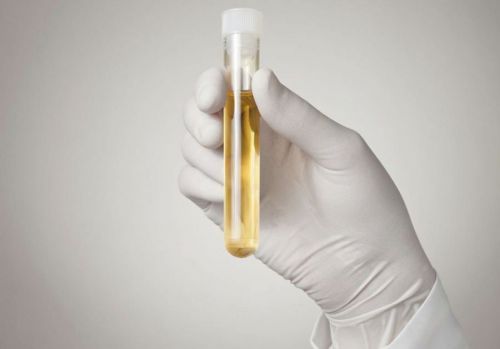
Experienced pediatricians know about this body of kids and always discharged in the direction of to pass stool for worm infestation. After treatment anthelminthic drugs, together with worms-parasites disappear, and impaired urination.
Precipitating factor pollakiuria is a stressful situation. But pediatric urologist still does diagnostics for the detection of inflammatory focus in one of the departments of the urinary system. The kid will need to hold the urination, and the doctor will check whether freed the bladder. Syndrome treatment daily of frequent urination in children is based on eliminating the causes of pathology. In some cases it is quite a few times to visit a child psychologist.
A urine analysis will help to establish the cause of frequent urination
Diagnosis
Frequent urination in children may signal a developing disease, so pediatric urologist conducts a thorough diagnosis. The doctor will examine the child, interviewing parents, and studying diseases in history. Necessarily conducted laboratory tests of urine and blood.
Formulation of a preliminary diagnosis is possible at the stage of studying of test results:
- urine: elevated concentrations of proteins, uric acid and its compounds, white blood cells indicates an inflammatory process in one of the organs of the urinary system;
- blood: decreased hemoglobin level, a small number of thrombocytes indicate a General deterioration in the health of the baby.
Technicians can perform the seeding of the biological sample in culture medium to determine the type of pathogen cystitis, glomerulonephritis, pyelonephritis in boys and girls. This technique also revealed the sensitivity of the viruses and bacteria to antimicrobial drugs. Sometimes the urologist recommended the collection of daily urine to determine the localization of the infectious focus.

For the differentiation of pathologies of the children are instrumental examination of organs of small pelvis:
- computed tomography;
- x-rays;
- cystoscopy;
- ultrasound examination;
- magnetic resonance imaging.
The procedures of the survey are assigned to children depending on age. MRI and CT can not do a newborn or young child. Boys and girls are not able to keep still throughout the procedure. Diagnosis allows to promptly detect the disease and to start its treatment at an early stage, when cells and tissues has not yet undergone irreversible changes.
A balanced diet is an important part of a comprehensive treatment
Treatment
If the parents noted increased frequency of urination a teenager or child, you should immediately make an appointment with the pediatrician. Before visiting the doctor can not give your child antibiotics or antimicrobials, as it reflected badly on the test results, making them unreliable.
Children’s doctor after examination and diagnosis will issue a direction to a more narrow specialists for therapy:
- nephrologist – for kidney disease;
- the urologist inflammation of the walls of the bladder or urinary ducts;
- endocrinologist – upon detection of diabetes and diabetes insipidus or suspected malfunction of the adrenal glands;
- a neurologist if the cause of frequent urination has become a stressful situation.
Diseases such as diabetes, and decrease or increase the production of adrenal hormones, need to work together endocrinologist and nephrologist. To avoid frequent urination, parents need to monitor compliance with child personal hygiene, try to avoid exposure during the games, and walks.
If a negative symptom of numerous diseases has appeared, it is not necessary to treat baby warmers with hot water or with antibiotics purchased at your local pharmacy. This “therapy” will trigger serious complications that will not allow to diagnose the pathological process.

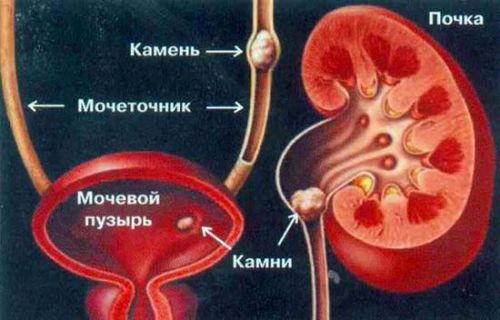


I also conceive hence, perfectly composed post! .
Wonderful blog! Do you have any tips and hints for aspiring writers? I’m planning to start my own website soon but I’m a little lost on everything. Would you advise starting with a free platform like WordPress or go for a paid option? There are so many choices out there that I’m totally overwhelmed .. Any ideas? Thanks!
I like what you guys are usually up too. This sort of clever work and coverage! Keep up the superb works guys I’ve added you guys to my blogroll.
Hurrah! Finally I got a web site from where I be capable of in fact take helpful information concerning my study and knowledge.